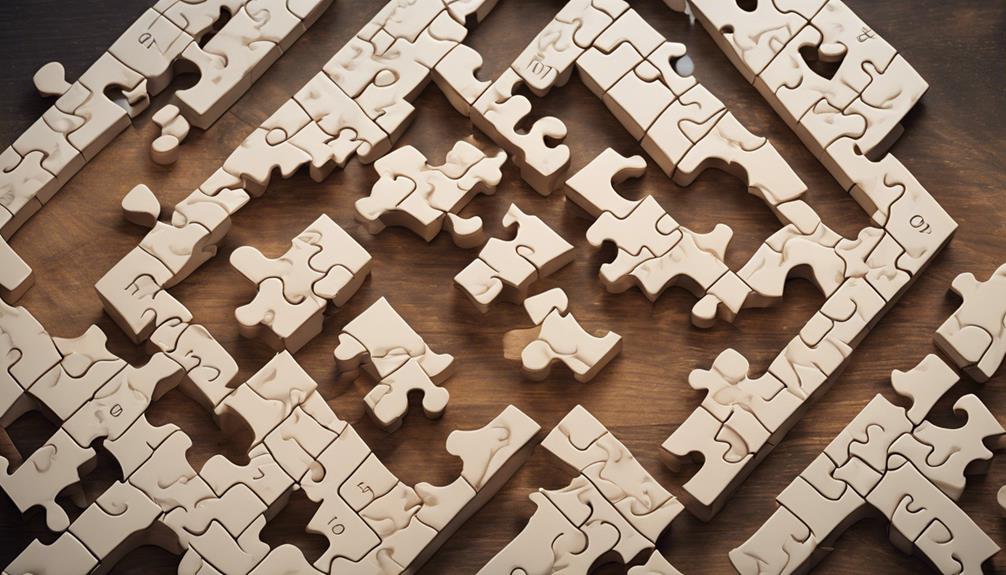Picture a meticulously cared for garden, perfectly curated with precision and attention to detail. Now, envision that same garden in the midst of a sudden storm, with strong winds threatening to uproot the carefully planted flowers.
Enneagram Type 1 stress responses are akin to this delicate garden facing turbulent weather, as their quest for perfection clashes with the chaos of stress.
Intrigued to explore how these perfectionists navigate through the storm to find inner peace and balance?
Key Takeaways
- Increased criticism and perfectionism under stress.
- Moodiness, irritability, and envy tendencies may surface.
- Focus on self-care, authenticity, and creative outlets.
- Managing stress through physical activity and mindfulness.
Enneagram 1 Stress Response Patterns
When Enneagram Type 1 individuals experience stress, they often exhibit distinct response patterns characterized by increased criticism, judgment, and perfectionism. The pressure can trigger a cascade of self-criticism and a hyper-focus on flaws, leading to a critical attitude towards both themselves and others. This heightened state of stress may manifest as moodiness, irritability, and even feelings of envy, mirroring traits from Type 4. The overwhelming need for perfection can fuel a sense of dissatisfaction, pushing Enneagram 1s towards a more judgmental and critical mindset.
In times of stress, coping strategies become vital for Enneagram Type 1s. Being creative, authentic with feelings, and introspective can help navigate these challenging moments. Cultivating a non-judgmental and open-minded perspective allows for a healthier response to stress triggers. By recognizing and addressing the tendency towards increased criticism, judgment, and perfectionism, Enneagram Type 1 individuals can work towards a more balanced and resilient approach to stressful situations.
Common Triggers for Type 1

Type 1 individuals are often triggered by situations that challenge their sense of justice, integrity, and adherence to moral standards. These triggers can evoke intense stress responses and emotional reactions in individuals of this enneagram type. Common triggers for Type 1 include:
- Witnessing dishonesty or unethical behavior can deeply unsettle Type 1 personalities, as it goes against their strong moral compass.
- Critical feedback or criticism of their work can be particularly triggering for Type 1 individuals, as it can feel like a direct attack on their efforts to uphold high standards.
- Disorganization, chaos, or a lack of structure can trigger anxiety and discomfort in Type 1 individuals, who thrive on order and adherence to rules.
- Being in situations where rules or guidelines aren't followed can lead to frustration and stress for Type 1, as they value adherence to established principles and moral standards.
Understanding these triggers is crucial in managing stress responses and developing effective coping strategies for individuals of Type 1.
Coping Strategies for Enneagram 1
To effectively navigate stress responses, individuals of Enneagram Type 1 can implement a range of coping strategies that promote emotional well-being and self-awareness. When facing stress, Enneagram 1s can benefit from engaging in creative outlets such as art or music to channel their emotions constructively. Being authentic with their feelings and engaging in introspective practices can help Type 1s process their stress in a healthier manner. Requesting self-care time and connecting with others without specific goals in mind can also aid in reducing stress levels and fostering a sense of balance.
Moreover, revisiting childhood activities that once brought genuine happiness can serve as a form of stress management for Enneagram 1s. By focusing on what they can control rather than fixating on perfectionism, individuals of this type can avoid burnout and maintain a more sustainable approach to managing stress. Embracing these coping strategies can empower Enneagram Type 1s to navigate stressful situations with resilience and self-compassion.
Understanding Type 1 Under Pressure

Transitioning from coping strategies to understanding the behavior of Enneagram Type 1 under pressure reveals the intricate dynamics of their critical and perfectionistic tendencies when faced with stress. Here's a breakdown to help grasp their reactions when feeling pressured:
- Critical and Judgmental Tendencies: Type 1s may become overly critical of themselves and others, striving for perfection even more intensely under stress.
- Moodiness and Envy: In times of pressure, Type 1s might struggle with mood swings and envy, adopting traits similar to Type 4 individuals.
- Engaging in Physical Activity: Coping mechanisms for Type 1s often involve physical activities to release pent-up tension and regain focus during stressful situations.
- Prioritizing Self-Care and Support: Understanding Type 1 stress responses emphasizes the importance of self-care practices and seeking support from loved ones to maintain a healthy balance between their emotions, reactions, and the demands of pressure.
Tips for Managing Type 1 Stress
When managing stress as an Enneagram 1, focusing on self-care practices and engaging in physical activities can be beneficial in promoting emotional balance and reducing tension. Type 1 individuals, known for their perfectionistic and critical tendencies, often respond to stress with judgmental thoughts towards themselves and others. To combat these stress responses, it is essential for Enneagram 1s to prioritize self-care and relaxation activities. Setting aside time for mindfulness and introspection can help Type 1s navigate their emotions more effectively and avoid becoming overwhelmed. Additionally, focusing on what they can control in stressful situations can prevent Enneagram 1s from fixating on unattainable standards. Engaging in physical activity not only helps release tension but also provides a healthy outlet for Type 1s to channel their energy. The table below summarizes key strategies for managing Type 1 stress:
| Strategies | Benefits |
|---|---|
| Self-care practices | Promotes emotional balance |
| Engaging in physical activity | Releases tension and stress |
| Practicing mindfulness | Assists in managing stress responses |
Frequently Asked Questions
What Does an Enneagram 1 Go to in Stress?
When stress hits, we Enneagram 1s can veer towards being critical, judgmental, and perfectionistic. This can lead to moodiness, irritability, and envy, resembling traits of Type 4.
We might get caught up in what we should be doing, feeling frustration and worry if we fall short. It's easy to feel like everything is falling apart and struggle with a sense of hopelessness.
Sometimes, we may overfunction, taking on too much through excessive cleaning or busyness.
What Is the Core Emotion of the Enneagram 1?
We, Enneagram enthusiasts, understand the core emotion of Type 1s as anger. This strong feeling, often turned inward or outward due to unmet standards, fuels their pursuit of perfection.
Their anger, rooted in a sense of duty and a desire for righteousness, can lead to self-criticism and judgment of others. Recognizing this anger's role is vital for crafting effective stress management approaches tailored to the unique needs of Enneagram Ones.
What Triggers Enneagram Type 1?
When we consider what triggers Enneagram Type 1 individuals, it's essential to recognize that situations challenging their sense of right and wrong can lead to critical self-judgment.
Conflict between their ideals and reality, perceived injustices, or violations of their moral code can all spark stress responses in Enneagram Type 1.
Feeling like they or others aren't meeting high standards can trigger frustration and inner turmoil for these individuals.
Which Enneagram Has Most Anxiety?
We believe Enneagram Type Six experiences the most anxiety. Their core fear of fear itself amplifies their worries, leading to constant anticipation of worst-case scenarios.
This type seeks security and reassurance to cope with uncertainties. Understanding their heightened anxiety levels can guide us in providing effective support for managing their fears.
How Can Enneagram 1 Stress Responses Help in Understanding Unhealthy Enneagram 2 Patterns?
Enneagram 1 stress responses serve as a key tool in comprehending unhealthy Enneagram 2 patterns understanding. When Enneagram 2 personalities face stress, they tend to exhibit exaggerated behaviors of their basic type. By identifying these stress responses, we gain valuable insights into the maladaptive patterns of Enneagram 2 individuals, providing a deeper understanding of their psychological framework.
Conclusion
In conclusion, as Enneagram 1 individuals navigate their stress responses, it's crucial for them to remember that perfectionism and self-criticism can be both a strength and a weakness.
By embracing their inner child, seeking support from loved ones, and allowing themselves to let go of control at times, Type 1s can find balance and peace within themselves.
Just as a delicate flower needs both sunlight and rain to bloom, Enneagram 1s can flourish by embracing their imperfections alongside their drive for excellence.









